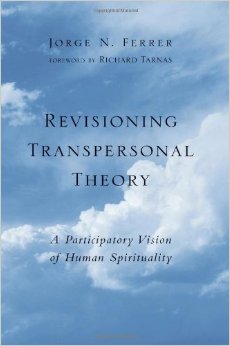|
TRANSLATE THIS ARTICLE
Integral World: Exploring Theories of Everything
An independent forum for a critical discussion of the integral philosophy of Ken Wilber
Jorge N. Ferrer, PhD, is the author of Revisioning Transpersonal Theory: A Participatory Vision of Human Spirituality (Albany, NY: SUNY Press, 2002) and Participation and Spirit: Transpersonal Essays in Psychology, Education, and Religion (Albany, NY: SUNY Press, forthcoming), as well as coeditor (with Jacob Sherman) of The Participatory Turn: Spirituality, Mysticism, Religious Studies (Albany, NY: SUNY Press, 2008). In 2000 he received the Fetzer Institute's 2000 Presidential Award for his seminal work on consciousness studies and in 2009 he became an advisor to the organization Religions for Peace at the United Nations on a research project aimed at solving global inter-religious conflict. Ferrer offers talks and workshops on transpersonal studies, participatory spirituality, and integral education both nationally and internationally. He was born in Barcelona, Spain.
I. Puente, "Participation and Spirit: An Interview with Jorge N. Ferrer", Journal of Transpersonal Research, 2013, Vol. 5 (2), 97-111’ Reposted in part with permission of the author. Reflections on Ken Wilber from a Participatory PerspectiveJorge N. FerrerIker Puente: Tell us about your first publications in the Journal of Transpersonal Psychology (JTP) and your debate with Ken Wilber.
Although Wilber's attempt to assassinate transpersonal psychology failed, it pushed the field into an identity crisis from which it is still recovering.
Jorge Ferrer: My first JTP publication, "Speak now or forever hold your truth," appeared in 1998 and was a critical review of Wilber's (1998a) The Marriage of Sense and Soul, in which he sought to integrate science and religion under the umbrella of a broad empiricism. Here I critiqued what I perceived as a residual positivism in his proposal that I found counterproductive for the legitimization of spiritual knowledge. This residual positivism was perhaps most evident in his defense of an unified methodology, drawn from the natural sciences, that used the widely discredited Popperian falsifiability as demarcation criterion between genuine and dogmatic knowledge in both science and spirituality. In his response, also published in JTP, Wilber (1998b) wrote that by falsifiability he simply meant ’we hold all our experiences open to further refinement.” As I retorted in Revisioning Transpersonal Theory, however, in the philosophy of science, the provisional nature of knowledge doesn't refer to falsifiability, but to fallibilism, something that everybody (even the hard scientists) accept as a feature of human knowledge since the nineteenth century, but not as a principle of epistemic justification or of demarcation between genuine and dogmatic knowledge (as Wilber used it). Although Wilber never responded to this rejoinder, he stopped using Popperian falsifiability in subsequent works so I can only assume that the critique was effective even if he never acknowledged its validity.  Jorge Ferrer My second JTP publication, "The perennial philosophy revisited," appeared in 2000 and was a general critique of the perennialist assumptions of transpersonal psychology that only mentioned Wilber tangentially (I later discussed Wilber's neoperennialism in Revisioning). The paper became the leading essay of the first issue of the Journal edited by Kaisa Puhakka (Miles Vich had been the editor since the Journal's inception in 1969). To my great surprise, I learnt that Wilber tried to prevent its publication by directly calling the new editor on the phone. (And this was not the last time that I discovered he sought to actively censor the publication of my work). When Puhakka naturally refused to comply, Wilber insisted that she should ”print one paper favorable of my perspective for every paper you print that is critical of it.” Once again, Puhakka refused to comply—I trust there is no need to argue that such a request is not only obviously unacceptable but also literally unheard of in the academic world. One or two days later, Wilber (2000a) sent a message to the organizers of a transpersonal conference in Assisi, Italy, announcing that he has ’ceased... affiliation with the Transpersonal Psychology movement” (p. 1), that JTP ”might collapse within a year” (p. 1) (after giving an incorrect number about its circulation), and tha t”the moment someone suggested ‘transpersonal’as the name, that moment the field was dead” (p. 2). As he did later in related essays posted in the web, he then introduced his own “integral psychology” as the way forward for serious students of psychology and spirituality. Before I go further: I am not suggesting that the above event was the only or even main factor in Wilber's departure from the field. It is very likely that the ReVision conversation of 1996—collected in Rothberg andSeanKelly's (1998) Ken Wilber in Dialogue—which revealed strong disagreements and even interpersonal conflicts between Wilber and major transpersonal theorists, paved the way for his decision. 
In an online Shambhala interview, "The demise of transpersonal psychology," Wilber (2002a; see also Wilber, 2000b) outlined the reasons why he left the field and considered transpersonal psychology to be dead. Those included that psychology as a science of interiors was dead, that transpersonal psychology had become ideological, and that the field was fraught in quarrels and disagreements. These reasons were suspicious, especially considering the contemporary vigor of depth psychology, Wilber's propensity to label as’ ideological. any perspective critical of his work, and that virtually all conflicts in the field had been between him and other scholars after his dismissive remarks of alternative spiritual approaches in Sex, Ecology, Spirituality (Wilber, 1995a). And it goes without saying that healthy disagreement and theoretical plurality are marks of the maturity, not decline, of an academic discipline. In an apparent attempt to deviate attention fromthose recent events, Wilber claimed to have stopped using the term transpersonal to refer to his work in 1983; however, this claim is contradicted by any cursory survey of his post1983 writings. In Grace and Grit (1991), for example, he described himself as "the foremost theorist in transpersonal psychology" (p. 22); in his contribution to Walsh and Vaughan's Paths Beyond Ego (1993), he portrayed transpersonal psychology as the only field that offered a comprehensive vision of the human being (Wilber, 1993); and in his JTP article, "An informal overview of transpersonal studies" (1995b), he located integral psychology as an approach within transpersonal psychology. Naturally, those of us aware of the sequence of events leading to his departure from the field did not give much credibility to his diatribe, but for most transpersonal scholars both in the USA and worldwide his departure from the field was, in Michael Washburn's (2003) words, a “seismic event” (p. 6). Although Wilber's attempt to assassinate transpersonal psychology failed, it pushed the field into an identity crisis from which it is still recovering. This is in part why I have decided to go public with this information after all these years. I frankly think the time is ripe to set the record straight. IP: Do you think that your participatory critique is still valid for Wilber's most recent work (Wilber5)?
Wilber-5 has seemingly assimilated aspects of the participatory approach into his integral vision; from a participatory perspective, however, many problems remain.
JF: A few years ago, one prominent member of the Integral Institute (who prefers to remain anonymous) wrote me saying that Wilber5 was a “participatory revision of Wilber-4.” Indeed, as Michael Daniels pointed out, Wilber5's proposed cocreated nature of the spiritual path, language of participation, and use of the myth of the given in spiritual critical discourse are central features of the participatory approach introduced in my early work (see Rowan, Daniels, Fontana, & Walley, 2009). Initially, I was startled by this participatory reform, especially given Wilber's (2002b) dismissive account of Revisioning as expressing “a greenmeme approach to spirituality, a kind of participatory samsara equated with nirvana” (unpaginated). As Daniels points out, however, Wilber often displays the disturbing scholarly habit of incorporating into his theorizing critical points made by others about his work—at times points he previously dismissed as misinformed or conveying less evolved levels of spiritual discernment—and presenting them as autonomous developments of his thinking. In this case, Wilber-5 has seemingly assimilated aspects of the participatory approach into his integral vision; from a participatory perspective, however, many problems remain. Despite Wilber's (2006) significant revisions (e.g., letting go of ‘involutionary givens’in transpersonal stages), his current model holds that (1) spiritual development and evolution follow a sequence of (now evolutionarily laid down) states and stages (psychic/subtle/causal/nondual); (2) this sequence is universal, paradigmatic, and mandatory for all human beings regardless of culture, tradition, or spiritual orientation; (3) nondual realization is the single ultimate summit of spiritual growth; and (4) spiritual traditions are geared to the cultivation of particular states and stages. To be sure, the Wilber-Combs lattice complicates this account further by allowing that practitioners from any tradition and at any developmental stage can, in theory, access all transpersonal states (though the states would be interpreted from those corresponding perspectives). ' Wilber-5, however, retains a core problem and adds a new one. On the one hand, some traditions still rank lower than others since they aim at supposedly less advanced spiritual states and stages (e.g., theistic traditions rank lower than nondual ones, shamanic ones lower than theistic, etc.). On the other hand, the new grace offered to rival traditions is a Faustian bargain: theistic and shamanic practitioners are told that they too can reach the most advanced spiritual stage, but only if they sacrifice the integrity of their own tradition's self-understanding by accepting Wilber's spiritual itinerary and nondual endpoint. (Note here that since Wilber's nonduality is admittedly different than traditional versions, even nondual practitioners may need to strike this bargain in order to qualify as ‘proper’ suitors of his final realization). Although different traditions obviously focus on the enacting of particular mystical states and goals, I strongly dispute the plausibility and legitimacy of Wilber's hierarchical rankings. Summing up, even after Wilber's (2006) ad hoc modifications, his current model still privileges nondual, monistic, and formless spiritualities over theistic and visionary ones, even as it seeks to confine the multiplicity of spiritual expressions to a single, unilinear sequence of spiritual development. Furthermore, Wilber-5 continues to reduce the rich diversity of spiritual goals (deification, kaivalyam, devekut, nirvana, fana, visionary service, uniomystica, etc.) to a rather peculiar hybrid of Buddhist emptiness and Advaita/Zen nondual embrace of the phenomenal world. Insofar as Wilber's model retains this neoperennialist construction, as well as its associated doctrinal rankings of spiritual states, stages, and traditions, the essence of the participatory critique is both applicable and arguably effective. From a participatory perspective, Wilber's nondual realization is simply one among many other feasible spiritual enactions—one that it is not entirely holistic from any contemporary perspective recognizing the equal spiritual import of both transcendent and immanent spiritual sources (for extended discussion, see Ferrer, 2011a). |